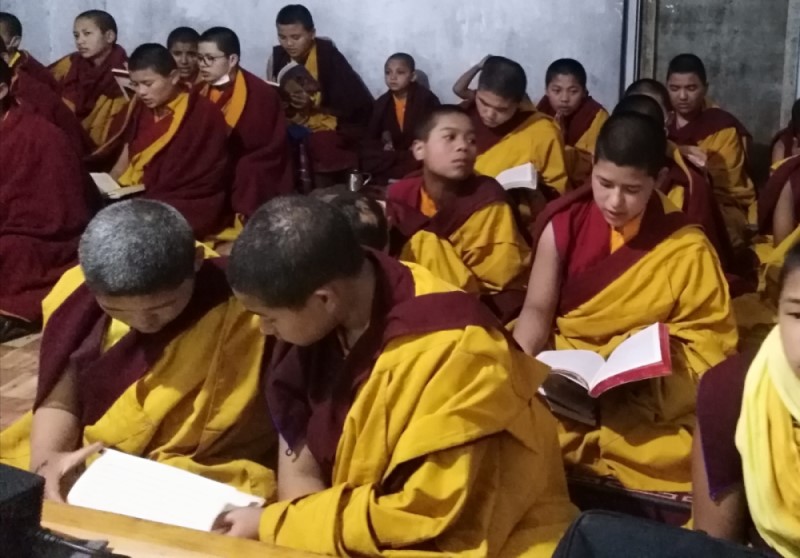法王新闻 | 2021年03月
『第6届谶摩春季』噶玛巴米觉多杰自传•第12天第1堂課
『6th Arya Kshema』AUTOBIOGRAPHICAL VERSES OF KARMAPA MIKYÖ DORJE•12-1
༸རྗེ་བརྒྱད་པ་མི་བསྐྱོད་ཞབས་ཀྱི་རྣམ་ཐར་བཀའ་ཁྲིད། བདེ་བྱེད་མའི་དཔྱིད་ཆོས་ཉིན་བཅུ་གཉིས་པ།
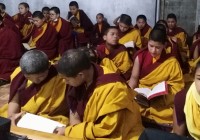
時間:2021年3月4日晚上9:00-10:00(北京/台北/香港)March 04, 2021
中文口译:堪布丹杰
听打:释妙竹
English text source from: Arya Kshema website
宗客巴大师与噶举派的因缘
Je Tsongkhapa and the Kagyu; The Sixth and Seventh Good Deeds
听得到吗?(之后例行公事飞快地念了一堆听不懂的祈愿文)
和达兰萨拉上密院的因缘
首先问候大家吉祥如意。这个星期的课程延迟了一天才上课,首先要请求各位的谅解,接下来在课程开始之前,我想先讲一些话,最主要是几天前听到达兰萨拉上密院受到了新冠疫情的影响,大家都比较困难,听到这个消息我也很担心,因为不太知道这个细节到底是怎么样,所以,也没办法多说些什么。现在的情况是,不少的僧众受到了感染,但大概只有一位是比较严重的,其他大部分的僧众健康状态都很好,甚至很多都没有任何的症状发生。那僧团中年纪较长的僧众们应该都没有受到这些感染,所以情况不是太糟糕。
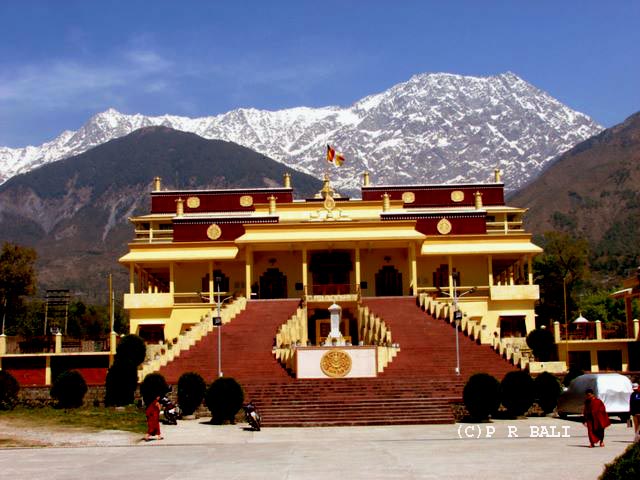
本人出资和设计建造的大殿,两边僧舍
一概都无
我从西藏到了印度之后,大概一两个星期左右我就到了上密院,当时上密院只有一些僧人,大部分都是准备要搬迁,本来只想住在那里一两个星期,但是最后还是常住在那里,至今有十八、十九年。在这么多年当中,他们让我把上密院上上下下都当成自己的家一样,没门的地方弄个门,没窗的地方也弄个窗。让我把房间打通,把墙敲掉等等。但是我从来没有听到有过一声的抱怨,寺院是非常地照顾跟配合。其实楚布办公室不只我一个人,人员是很多的,整个上密院的大殿上下好像都被我们霸占了一样。但是僧团的堪布仁波切为主的上师、总管还有僧团大众呢仍旧提供我们一直的支持,还问我们需要些什么照顾吗?总之,真的是特别的照顾。我在印度的那段时间,虽然经历了这么多的困难,甚至我都怀疑说到印度的这个决定是否是正确的。但是有一点我确认是绝对没错的一个决定,运气好吧,就是我选择住在上密院,这真的是一个正确的选择。不止我这样想,我的姐姐还有从西藏一起过来的人,还有拉章楚布办公室的所有的人员都这么一致地认同。所以上密院实在是恩德很大的。有时想,就算我住在一个噶举派的寺院当中,也不见得会受到这么好的一个待遇,冬天几个月住在菩提迦耶的时候,当时都还是会有一些声音的,但是我住在上密院这么多年,从来没有听到任何声音,有时候我想这就是一个大寺院特有的一种气度吧。那么,我长时间住在上密院,很多人可能想这真是很幸苦,好可怜,怎么住在这样一个寺院。但是就我个人来说,我从来没有觉得很困难很幸苦,从来没有觉得困扰。
The Gyalwang Karmapa began by updating everyone on the Covid 19 outbreak at the Geluk Gyuto Tantric Monastery near Dharamsala, his base in India for nearly eighteen years. He described the great kindness the monks and monastery staff had shown him and his labrang during that time. They could not be faulted for the support and co-operation they had given him and his staff. Contrary to what many thought, staying at Gyuto Ramoche Monastery had not been a difficult situation for him personally, and he had felt at home there.
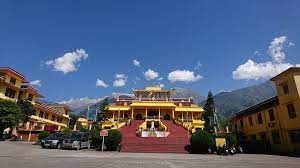
已经建了不少僧舍,如图
曾经上密院一些年长的僧众跟我说过,当他们1959年从西藏前往不丹,经过不丹的时候,当时第十六世法王噶玛巴就给予过他们很大的帮助,上密院的年长的僧众都这样跟我说,所以他们也都认为跟噶玛巴有一个特殊的因缘。我自己来说,在离开西藏的时候,做了一个梦,就梦到自己走在现在上密院上面的一个法轮的旁边,同时还很清楚看到上密院前面有这样的僧舍,或许那时候就是我会去上密院的一个征兆的梦境。同时离开西藏之前,有一次到拉萨朝圣,刚好有一次机会去小昭寺,在那之前我是没有去过小昭寺的,那就是我第一次去小昭寺,总之,从这些征兆来看,似乎很早就知道可能会在上密院住很久的。这都是好像冥冥中注定的,它不是一个碰巧的,一件很幸苦、很困难的一个遭遇,我不觉得,而是命中注定的一个情况。
Many of the older monks had fled Tibet through Bhutan and felt a connection. While still in Tibet, he had seen Gyuto in a dream and had visited Ramoche Monastery in Lhasa for the first time shortly before he left for India. This led him to believe that there had been some purpose in spending so many years at Gyuto.
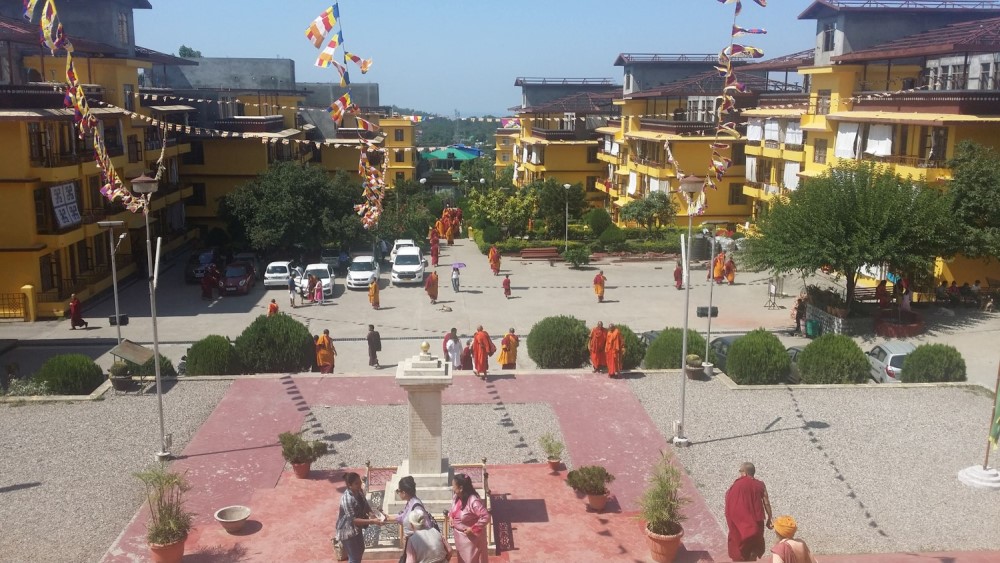
边僧舍已密密麻麻地衍生到马路边了
,楼层之上又再拼命加盖
总之因为这些原因,那么还有带着感恩的心,现在这个僧院遭遇到这样幸苦的时候,我们都要一起祈愿,希望他们的疫情都快平息,没有一个僧人遭遇到困难。但就像刚开始说,其实也不用太担心,因为上密院在疫情刚开始的时候,听说他们就有将近半年的时间做非常好的预防的工作,再加上现在印度的疫情也开始趋缓,禁令也开始放宽,大家也都对新冠疫情稍微放松警惕的一段时间,刚好在这样一个时候,上密院却感染了疫情,我想无论如何实际上,他们还是放心,我想,应该不会太严重的。
He requested everyone to pray for the monastery outbreak to subside and cautioned that this situation had arisen because people were paying less attention to precautions after a lengthy lockdown.
Bamboo评论:Bamboo在印度跟着大宝学习时,他常驻的三个寺庙,两个噶举派的寺庙——创古金刚寺和德噶寺的旅馆Bamboo从来都住不进,创古寺的之前说了,不是被赶出来,就是差点被整死。而菩提迦耶的德噶寺,2014年初祈愿法会做义工时,因为远远地喊了一下大宝,想跟他汇报自己干活的厨房在用香菜给僧众做饭(以前听海涛法师说香菜又名芫荽,也是五辛,怕僧众吃了修法全部失灵),这时德噶寺楼里突然冒出一群印度壮汉,把Bamboo拎出了德噶寺,德噶寺还雇了这些印度人守着寺门,甚至不让Bamboo再踏进一步。后来大宝的姐姐出面才勉强又见了次大宝,但那个场合也无法说任何事情。虽然后来知道香菜并不属于五辛,大宝也不好直接回答Bamboo而让海涛法师失了颜面,但德噶寺当时的代管——明就仁波切的哥哥措尼仁波切雇这些印度人来欺负大宝的信众的用意何在呢?
唯一Bamboo跟着大宝能住进的寺庙旅馆就只有这个属于格鲁派的上密院了。甚至有一回,Bamboo想起大宝说:“弟子要在上师近前修法。”就死活要在晚上呆在上密院大殿旁,大宝的窗下彻夜打坐, 即便被印度官方派驻的警察揍开了好几次,上密院也没因此把Bamboo赶出寺庙,不让再进寺庙过,上密院方面自始自终都未为难过Bamboo。所以大宝才会说“住上密院绝对是正确的选择”。
也因为这个原因,后来即便上密院麾下的法王办公室用手中大宝的几个官方账号和网站,发了不少假消息,又是黑大宝又想引Bamboo上当。包括二月初Bamboo刚到墨西哥时,就操控大宝官方账号发了一大堆好像大宝要圆寂似了的消息,想引得Bamboo冲动偷越美墨边境去见大宝最后一面吗? 可惜Bamboo没上当的说。护法神也就是念在曾经对Bamboo的恩德的份上,这次也只是轻轻的惩处了一下,让亲身体验了一回这个新闻制造出来的小流感疫情而已。
后面Bamboo也附上了新闻报道的内容,里面说根本找不到感染源,因为当时外地来的15个僧侣都是阴性,而上密院疫情一开始就采取了最严密的防护措施,彻底封闭了寺院。所以这只是个轻轻的警告,要知道 业报来时,是根本不需要任何途径的。无非是之前有一些恩德,才会重罪轻报。但不管怎么样,Bamboo自始自终都会记得因为上密院的恩德,自己才能在大宝近前学习了最重要的一段时间。Bamboo也始终觉得格鲁派的寺院的确比噶举派的寺院要有气度。
2011年,法王办公室想用信众供养的金钱在印度买块地,建个名义上属于大宝的寺院让他住。结果当时的印度政府就说大宝是中国间谍,并以洗钱名义没收了这些用来买地的钱,听说好像是六、七百万美金。大宝从此就一直借住在格鲁派的上密院了。信众供养大宝的金钱也都归这些他暂住的寺院,或者活动主办方所有, 因为难民,他在印度没有自己的银行账户,大笔现金放在法王办公室,印度政府又会说是洗钱。所以他在印度18年,既没有丝毫自由,也没有属于自己的任何财产和金钱。
宗客巴大师与噶举传承
Je Tsongkhapa and the Kagyu Tradition
那么在讲到上密院,同时,我也想讲一些有关宗客巴大师的内容。一般来说,上密院和下密院是宗客巴大师持守弘扬密法很重要的两个僧院,这两个寺院对于整体佛教,尤其是宗客巴大师的教法是非常重要的两个地方。格鲁派当中有三个重要的本尊,就是:密集金刚、胜乐金刚和大威德金刚。其中宗客巴大师特别注重的应该就是密集金刚。有一个说法是:有密集金刚的话,就有宗客巴大师的教法;没有了密集金刚,就没有了他的教法。在蒋央确杰撰写的一个宗客巴大师的密传当中,就提到一段内容,跟玛尔巴的教法有关的一段内容,
His Holiness explained that Gyuto and Gyume are the two great tantric monasteries and very important for Buddhist teachings in general and in particular for the tantric teachings of Je Tsongkhapa, which are based on the three tantras brought from India to Tibet by Lhodrak Marpa Lotsawa. The three main yidams in the Geluk tradition are Guhyasamāja, Chakrasamvara, and Vajrabhairava. As Je Tsongkhapa regarded Guhyasamāja to be the most important, this tantra is regarded as the quintessential Geluk tantra. Jamyang Chöje’s namthar of Tsongkhapa reads:
On a throne studded with many jewels
Is the omniscient Buton Rinchen Drum
Who gave him the root tantra of Guhyasamāja
And said, “Be the master of this.”
I supplicate the glorious guru.
He gave him the volume, and with a mantra and mudra,
Blessed him on the top of his head.
He realised that the points of mixing and phowa from Lhodrak Marpa
Are the tantra and the pith instructions of the Noble One.
I supplicate the glorious guru.
这里就说:玛尔巴的密法,就是“迁识法”是密续的密意和龙树父子的口诀(Bamboo批:印度教的人也会‘迁识法’)。
This shows how Je Tsongkhapa developed certainty that Marpa’s instructions on mixing and phowa are the true meaning of tantra and pith instructions from Nagarjuna and his disciples.
同样之后,竹巴衮列大师也曾经说过,他是一个很心直口快的人。有一次许多闭关行者就来见竹巴衮列,他们就说:“那些辩经的僧众,总是在文字上咬文嚼字,实际没什么东西。”他们就提到说:“最好是有一些真正实修这些密法的人,等等。”竹巴衮列大师的性格就是“别人说是,他就说不是。”他是这样一个人,他就回答说:“你们什么都不懂,你们最好给我闭嘴。”总之说了很多,竹巴衮列大师对格鲁派这部分提到说:“洛扎•玛尔巴从印度带回来,如同虚空般的密集金刚、胜乐轮、大威德、喜金刚等续典,如果这样去修持的话,借由修持生圆双运之道,气行进入中脉的要义,依靠佛母借由观想而修的无误方式在格鲁派当中也是有的。”同时他后面还提到说:“萨迦派当中也有这样的修持。”所以他就对那些闭关行者说:“你们根本是听不懂的,你们还是给我闭嘴。”这位竹巴衮列大师在西藏历史当中是非常心直口快、直语的一个人,我就引用他这段话。
As Drukpa Kunley said, “The Gelukpas have the tantras that Marpa brought from India...and they practise and meditate on the path of unified creation and completion. They have the point of prana and mind entering the central channel; the unmistaken practice in the Geluk school.“
接下来,我引用了一些宗客巴大师亲传弟子的话,或许大家对他会有更多的了解。宗客巴大师的亲传弟子,也是帕竹噶举的一个叫间阿•索囊给岑在一个问答录,叫《琉璃鬘》中有提到:宗客巴大师不仅没有驳斥噶举派,而且将噶举派当成自宗来承认。首先在见解上,宗客巴大师喜欢的是应成派,尤其是月称论师的见解,宗客巴大师就说:“玛尔巴大师也是应成派。”原因是什么?因为在玛尔巴大师的道歌中,曾经说:他前往东方恒河岸边,因为梅吉的恩德,了悟了基础法性无生,心性、空性的道理。
Je Tsongkhapa’s own disciple, Chennga Sönam Gyaltsen of the Pakdru Kagyu lineage, said in Questions and Answers: A String of Vaidurya that Je Tsongkhapa never refuted the Kagyu tenets. He also said that they could be proven to be in his own tradition. In terms of view, generally, Je Tsongkhapa liked the Prāsaṅgika [Consequentialist] view, and especially the teachings of Chandrakirti. He said that Lord Marpa was also a Prāsaṅgika, as evidenced by Marpa’s song: On the banks of the river Ganges in the east, Due to the kindness of the great guru Maitripa, I realised the ground, the non-arising dharmatā The mind blazed in emptiness.
这个梅吉巴的见解和修持的传承者就是玛尔巴大师,而梅吉巴就是应成派。怎么证明梅吉巴是应成派呢?他说道:“未经上师语庄严,中观亦为中等见。“梅吉巴的一个亲传弟子叫楞结•给呗多杰提到说:”若未经月称阿阇黎的教语庄严来理解圣龙树和提婆,也只会对中观有中等的体悟。“有这样一段话。所以,宗客巴大师认为玛尔巴是应成派的。另外,宗客巴大师又一再地赞誉说:”玛尔巴大师是返藏的一切密续大师、金刚持当中最为卓越的一位。“
His argument was that Maitripa taught the non-arising dharmatā to Lord Marpa and that is the meaning of the Chakrasamvara tantra. Another of Je Tsongkhapa’s disciples, Lhenchik Kyepay Dorje, said that there was no greater vajra master than Marpa.
另外,中观应成派的思想中有承认一切法为有后,有分成视其为实,视其为不实的两派。宗客巴大师的思想依循的是前者,而密勒日巴尊者的思想也是这样子的。这是因为密勒日巴尊者对长寿五天女的一个道歌中提到:「一切全知的佛陀为了符合凡俗的念想,而说”一切法有“」,「若依胜义上来看,则连除障之佛陀也不存在」,同时,「万有显现之有和诸法空性之无,二者同性一位。」
The Prāsaṅgika fall into two traditions: one presents all phenomena as mere existents saying they become true; the second maintains that they do not become true. The first is a presentation of relative truth. Je Tsongkhapa and Milarepa both took the former position. One of the songs of Milarepa makes this clear: In accordance with all you beginners’ thoughts, The omniscient buddha said that Everything exists. This presents the conventional or relative truth of the existence of phenomena. In terms of the ultimate truth, There is not even a buddha… This presents the ultimate truth of the non-existence of phenomena. The existent appearing as things And non-existent emptiness Are inseparable in essence and one flavour.
所以,宗客巴大师认为,虽然胜义上轮回与涅槃的一切法连名字也不存在,但是在世俗上是肯定世俗的用词,包括众生能成佛等等。如此,仅存有名字,设定和显现缘起,与自性不成之空性这两者同体一位,因此是显空不互舍的。这种观点是噶举祖师特殊的思想见解。宗客巴大师是这样来解释。同样,宗大师又说:“冈波巴大师所说的,体会空性后,会更深入缘起。这样的教导是口诀之精华。”同样,宗大师也说:“帕莫竹巴真是量士夫。”他对于圣者羊坤巴大师也赞叹说是:“圆满次第、到达究竟的一个瑜伽士。”宗客巴大师曾经也说过:“大手印行者在不遮灭妙观察慧的情况下维护正见,这是维持正见的好方式。”不然,很多人说:大手印行者好像遮灭了「妙观察智」是和尚的见解。同时,宗大师在讲解密法的时候,当时,藏传佛教最流行、出名的是,时轮、喜金刚和密集金刚。特别宗客巴大师是把密集金刚和胜乐金刚作为他主要的本尊。密集金刚主要是玛尔巴传承和管氏传承两系最为卓越。宗客巴大师就曾说:“若要将文本中不论是明显或隐晦的这些意指都阐述清楚的话,符合修行者的许多经验和观想来产生定解,那就一定要依循玛尔巴尊者的口诀。”同样,胜乐金刚的法门上,宗客巴大师也依循那若巴的口诀为主,并且补充了印度其他大成就者的教导。虽然,宗大师并没有就喜金刚有深广的介绍,但也主要是以颚法身金刚的传承为主,致于圆满次第的部分。宗大师曾说过,他认为「那若六法」是完善、规划了父续与母续一切的要诀。
This establishes the interdependence of phenomena appearing as things and being empty by nature. Je Tsongkpaha said that linking appearance and emptiness in this way without contradiction was a particular view of the Kagyu school. He pointed to a saying of Lord Gampopa, “When you realise emptiness, you must be more detailed about interdependence,” and said it was a crucial point. Je Tsongkhapa also commended Phagmo Drupa Dorje Gyalpo [a direct disciple of Gampopa and founder of the Phagdru Kagyu] as an authoritative being. He praised Mahāmudrā, though later scholars accused it of being a nihilistic view. He maintained that the best tradition on the Guhyasamāja Tantra came from Marpa, whose pith instructions helped students develop certainty. Likewise, he said that the most important tradition of Chakrasamvara came from Naropa, augmented with teachings from other Indian masters. In terms of the completion stage of the father and mother tantras, he recommended the Six Yogas of Naropa as giving the clearest explanation of the crucial points.
总之,不论宗大师观点或行持上都和噶举派非常的亲近,只是在一些用词、遣字上观点不同,实际的义理上却没有太多的出入。虽然宗客巴大师对于噶举派有一些驳斥,但并不是因为他讨厌噶举派才这样驳斥的,在宗大师的其他一些著作中也有对于印度大师们的一些驳斥。总之,宗大师跟噶举派的传承是非常接近的,这是非常好的一件事情。这是刚刚他的亲传弟子索囊间阿说的。还有宗客巴大师的十大弟子叫巴赛嘎究,他是负责记录宗大师文集的第五函——《密集金刚生起次第》的一个笔记者,我得到了一部他曾写下的阐明噶举法教的著作的珍本,其中清楚提到说:「一切诸佛之慈悲与智慧归于一处,为了利益众生而于此南阎浮提雪域投身为人,他经由二大车轨、二乘六严的礼典,两门来分析无比达波噶举的传承,此即我的上师,名讳中带有慧一词的东方宗客巴,切勿诽谤他有意伤害达波噶举传承,等等。」这是都在赞叹说,宗客巴大师并没有驳斥噶举,实际上在弘扬噶举派,不要去诽谤他。
Although there are different terminologies, the actual teaching on view, meditation and conduct in the presentations by Tsongkhapa and the Kagyu are basically the same. There are differences in explanation but no significant difference in meaning. There is no evidence to suggest that Je Tsongkhapa was antagonistic towards the Kagyu in any way. If he sometimes refuted their view, we have to remember that he also refuted the views of Indian masters. We should be delighted that Je Tsongkhapa maintained the precious Kagyu lineage was in accord with him and be reassured that he never did anything to harm the Kagyu teachings. On the contrary, he supported and propagated them.
当然宗客巴大师所提的观点也有分成完整观点或部分观点,那么他的观点是否彻底否定早期藏传学者的观点,还有跟他们早期的观点之间是否有异同等等,这些其实都值得再去考据的。比如宗客巴大师在《善说经鬘》当中,在理解十二缘起的时候说:「如此超越八边的状态并非依于圣龙树师徒的著作所说,因为他们的名讳本身就足以亲据众人,所以在此介绍的是前所未闻的观点。」依这段来看,宗大师的观点是前所未见、闻所未闻的。不仅如此,大师的亲传弟子,也就是藏传佛教当中的智者库洛•千波许奴贝,他的传记当中则提到说:宗客巴大师对佛教的贡献就跟佛陀本人出世是一样的,当他参加长净时,甚至山都会向他礼敬、鞠躬。在一个许连提戳的文献中还提到说:金刚手都无法测之宗大师的功德。这无疑是对宗大师最高的一种赞叹。但是很多的弟子并没有太重视这部著作,还有一次这位库洛大师说:“宗客巴大师在解释了不了义、善说藏论时说:于我现在所说的判教方式不违背的判教方式只有在《宝性论》当中有提到过。当时可能这些弟子没有福缘吧,当时应该马上献曼达祈请请他再讲说,应该要这样子请求,但是没有人这样请求。”有这样一段记录。所以从这位库洛•千波许奴贝大师的文字来看,宗大师在世的时候,他的弟子大都只依循或重视他的部分教导,但是对于其他的经论大家都不太重视。譬如说《善说经鬘》这部论,像是在哲蚌寺、果莽查仓还有安多大部分的学者都很重视,但是其他格鲁大的寺院格鲁派的行者、追随者并没有特别注重这一段论。
同样,宗客巴大师在那若六法的引导文,叫《据三净中》(音译)也提到,道歌中会用的一个词叫利根者,指的是证悟层次高深的行者,还有据说是宗客巴大师笔记的文献中也提到:杂任咋日的喜金刚著作中也提到不需要四灌顶即能成佛的口诀等等。总之,古代藏传佛教有些独特之处,这是在面对古代藏传佛教传承的时候,若发现独特之处就会支持和研究,若发现它的思想有共同点,就会隐藏或忽视,这种作法是可议的。释迦牟尼佛的教导之所以有大乘跟小乘,十八部派,唯识跟中观等分类,这是佛法广传弘扬的一个征兆,也是佛法能够满足不同行者的一种表现。同样,宗客巴大师这样一个知识与实修兼备的一位大师,自然会有许多不同人对他的观点、主张和思想的解释,这也就是大师他的智慧非常宽广,非常广大的一个征兆。但是很多时候,后学弟子认为宗大师的观点必须有某种正统性,必须有某种版本才是正确的,其他都是错误的。若是过度追求这种正统性的话,我觉得反而对大师的事业弘扬影响到其他藏传佛教宗派。
It appears that Je Tsongkhapa had his own particular presentation of the Middle Way view. In the Golden Garland of Eloquence he wrote, “I have not described the nature free of the elaborations of the eight extremes, as Nagarjuna and his disciples did, because the words alone would scare people.” Not only that, his direct disciple Gö Lotsawa Zhönnu-pel [Tibetan historian, author of the Blue Annals] described how “Je Rinpoche appeared in Tibet, like a buddha appearing in this world.” When Tsongkhapa went to sojong and other rituals, he was so magnificent, it felt as though the very mountains began to shake. In another text, The Great Medicine of Amrita, it says that even Vajrapani would be unable to understand the qualities of Je Tsongkhapa. And yet his students did not always pay close attention to all his teachings, only to some aspects of them. By emphasising specific philosophical points, the Karmapa observed, it may be that Je Tsongkhapa‘s own followers have become an impediment to the spread of his teachings. Je Tsongkhapa himself was able to teach a wide range of students, from low to high capacity.
总之,今天简单为大家介绍下宗客巴大师,我们可以看到是从不同的角度,还有从他不同的弟子的说法来看。我我们不应该有这样的宗派之见,而是该以整体佛教,尤其以藏传佛教来看,宗客巴大师真的是有很大的恩德的。不然很多时候一不小心,我们也不能说是智慧不足,在解释他的这些见解的时候,就很难真的解释的清楚。大概就简单介绍到这里。
His Holiness concluded by saying how very important it is for us to look at things from a broad perspective. The more we can view things from all perspectives and consider Je Tsongkhapa beyond a narrow sectarian view, we can see how he benefitted the teachings in general and had a lasting influence on all Tibetan lineages.
《妙行自传》第六个颂文
The Sixth Good Deed: The Undeceiving Three Jewels
之前谈到《妙行自传》当中第六个颂文,也就是还没讲完的部分,当时没讲完我们今天把它讲完。首先,为了帮助大家能够记起来第六个颂文是哪一个,先投影给大家。就是这个。
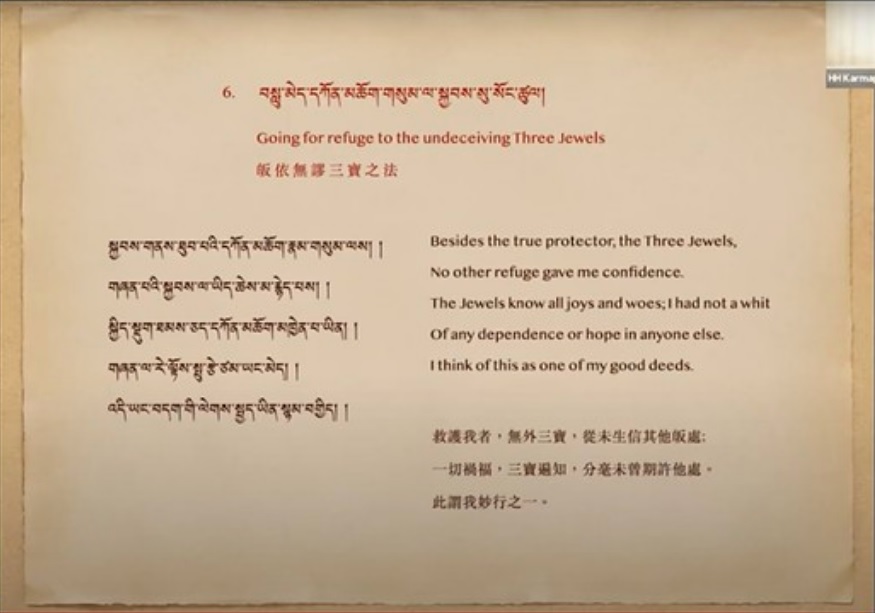
(6) བསླུ་མེད་དགོན་མཆོག་གསུམ་ལ་སྐྱབས་སུ་སོང་ཚུལ། Going for refuge to the undeceiving Three Jewels 皈依无谬三宝之法
༦༽ སྐྱབས་གནས་ཐུབ་པའི་དཀོན་མཆོག་རྣམ་གསུམ་ལས། ། གཞན་པའི་སྐྱབས་ལ་ཡིད་ཆེས་མ་རྙེད་པས། ། སྐྱིད་སྡུག་ཐམས་ཅད་དཀོན་མཆོག་མཁྱེན་པ་ཡིན། ། གཞན་ལ་རེ་ལྟོས་སྤུ་རྩེ་ཙམ་ཡང་མེད། ། འདི་ཡང་བདག་གི་ལེགས་སྤྱད་ཡིན་སྙམ་བགྱིད། །
Besides the true protector, the Three Jewels, No other refuge gave me confidence. The Jewels know all joys and woes; I had not a white Of any dependence or hope in anyone else. I think of this as one of my good deeds.
救護我者,無外三寶,從未生信其他皈處;一切禍福,三寶遍知,分毫未曾期許他處。此謂我妙行之一。
米觉多杰其实从小就总是会想到死亡无常和轮回的痛苦,可以说是想太多、太有感觉了,让他夜里也没有办法睡眠,用白话来说,用不敬语来说,就是法王常常会哀伤地哭诉:哎呀,怎么办呀,真是死亡无常、轮回痛苦啊等等。
From the time Mikyö Dorje was young, he remembered death, impermanence and the suffering of samsara so keenly that it gave him insomnia. He was always complaining about them. He said that when we contemplate the meaning of impermanence, the most helpful idea is that the meaning of impermanence is momentariness. Phenomena do not endure from one instant to the next. Nor do phenomena need any additional conditions in order to perish; the moment they arise, they perish naturally. The texts talk about impermanence being nothingness. Because of this, Mikyö Dorje developed certainty in the explanation from the texts on logic that the meaning of impermanence is nothingness.
米觉多杰也曾经说过:"当我在想这个无常的意思的时候,他就了解到无常的意思就是刹那性,而这个刹那性的意思就是什么,就是刹那不停、不停的改变。而且刹那马上就会坏灭。它的坏灭不需要其他的因缘,当下自性就会坏灭。如此就知道无常即是无始,他对于这样升起了确信。同时他还说,任何世间的作为,尤其为了此生而做的各种计划,我彻底知道那些是完全没有意义的,这种领悟是来自于什么呢?来自于阅读密勒日巴、果仓巴大师等等的传记。"
He said: The reason why I saw that actions for this life, and in particular plans for this life have no meaning at all and the understanding I had from that, is from reading the namthar of Lord Milarepa and Lord Götsangpa.
密勒日巴的传记大家应该看过,竹巴噶举中认为说洛日巴跟果仓巴这两位大师可以说是两位典范,是什么典范,就是厌离轮回、出离轮回的两位竹巴噶举的典范。接着,米觉多杰说:"无论我跟哪位朋友分离,我刹那也没有升起过此生世俗的难过。"这段的意思就说,因为他彻底升起了这样的出离厌离的心,就算哪位朋友离开了、死亡了,我刹那也没有升起过这种此生世俗的难过。
His Holiness explained that Milarepa and Götsangpa are the two people within the Kagyu lineage who represent feeling utter revulsion for samsara. Now, no matter what friend I part from, I don’t feel any poignancy in relation to this life for even an instant. Basically, when he has no attachment to this life, His Holiness commented, when he parts from relatives and friends, for example when they die, he has no attachment to them at all.
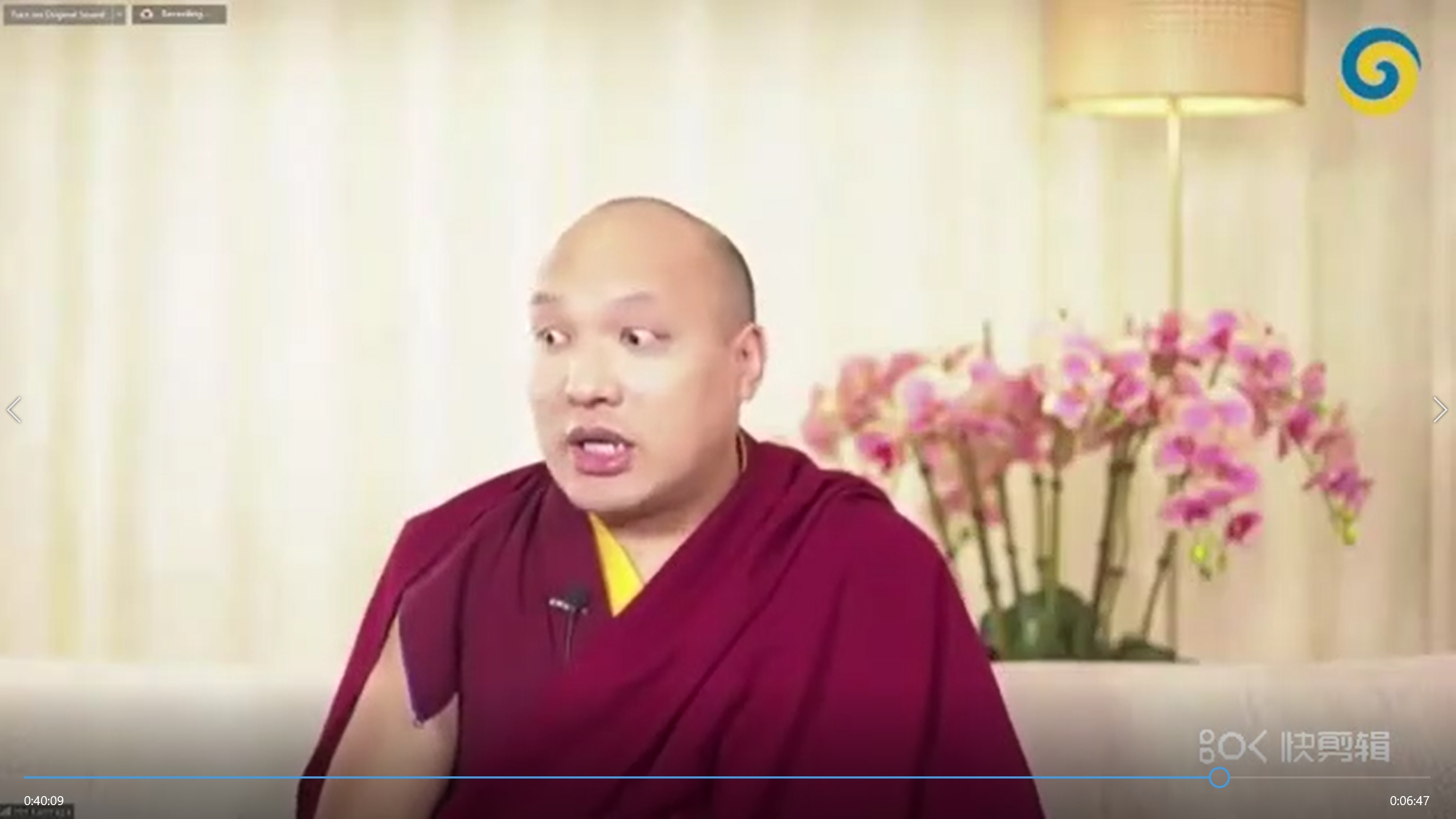
接着他说:“同样,我也觉得为了搞好此生世俗的关系,而跟人交往,是一点意义都没有的。”他还说,“当我抵达、来到了和此生相关的任何舒适愉快的地方,都有一种像是住到旅馆几天,随时都会离开的、分离的这种感觉。”(Bamboo批:米觉多杰自小的经历让他有种强烈的不安全感,这跟佛法其实没关系,而是一种病态心理。)
I only ever think that no matter who I associate with in order to have a good situation in this life, it is meaningless. When I arrive at any place that would be pleasant and nice in relation to this life, I continually have the feeling that things come and go, like renting a room in an inn for a few days.
他总是到了一个地方就会觉得“我就是到了一个旅馆而已”,他无论到达任何地方,都不会觉得说“这是我的,这是我会长久住的地方”。总而言之,米觉多杰总是在说“厌离啊、出离”,所以,很多人会形容米觉多杰是一个很胆小、很怯弱的人,还有他是一个反复无常的人。很多人会这样子形容他,背地里这样说他。但是米觉多杰他的回答是什么?
Mikyö Dorje always had this feeling of impermanence. To sum it up, Mikyö Dorje only spoke of world-weariness and the wish for liberation. He was criticised for this behind his back and seen as unstable —always changing his mind. Mikyö Dorje thought that his critics should go to their own beds, turn their thoughts inwards and examine themselves very carefully along these lines:
他说:我认为你们这些说我的人,你应该先回到你自己的房间,然后你的指头指向自己的心间,反省一下自己。指着自己反省一下。自己什么时候会死亡,你真的知道吗?你能够确定知道什么时候会死亡吗?你一点都不知道。死亡之后,你还期望说可以依靠现在你这个非常渺小的善心。但是死亡之后,你这颗微小的善心没什么用的,这么渺小的一点善心,这个是没用的。最后,你无论如何还是会投身到怎么样的善恶之身,会投身到什么样的地方,周围会有什么样的人,会得到什么样的东西受用,你都不知道,你连刹那间也听不到三宝的名称。如果你生到这样的地方,你该怎么办呢?然后一生当中你只能造恶和受苦这样的一个地方,你该怎么办呢,如果投身到这里?那是根本无法想象的,这真的是想到都会非常害怕的一件事情。你这时候还不会觉得有一点担忧、一点紧张说“该怎么办呢?”
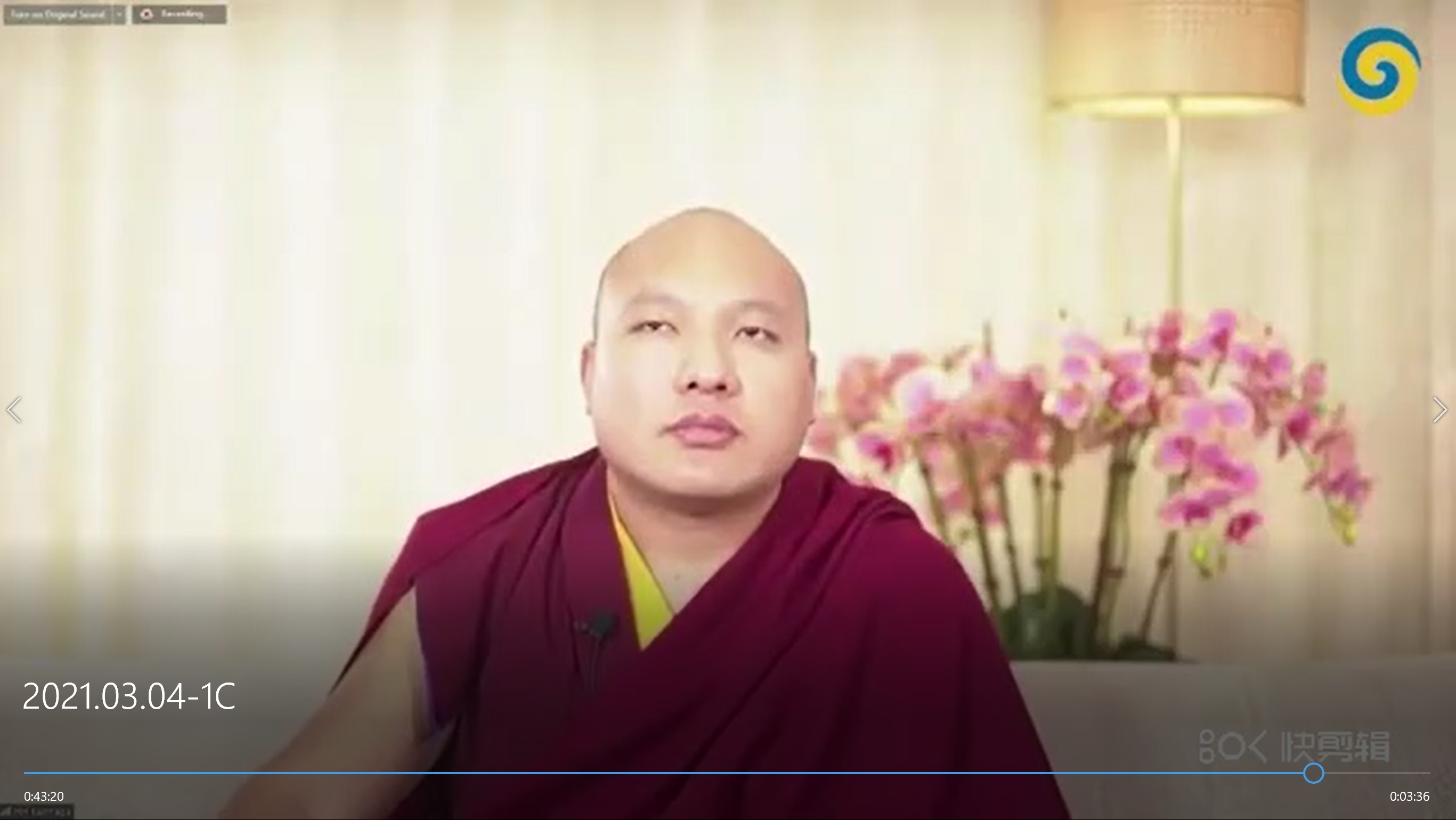
因此,你一定要舍弃为了此生而做的一切的世俗的任何行为,无论父母、亲人、朋友或者有力人士,或者你身边的弟子,对你有什么样的请求,或者其他人对你有什么各种好话、坏话,你都要告诉自己,这一切都不值得信赖和依靠,你不要看父母,也不要看亲人或者朋友,所以你应该怎么办呢?这里有三个,一个就是你要随缘吧;就随便吧,该来的就让它来吧。随缘吧,他们要怎么说就怎么说,随便吧,我会发生什么事,就这样子吧,该来就让它来吧,你的心是非常的笃定的,非常的确信的。(Bamboo批:可能Bamboo心里跟他祈请要当他小弟,好跟在后面捞点油水时,他就这表情)
Do you have any idea when you will die? When you die, you pin your hopes on your present tiny virtuous thoughts, but that virtue is not enough to determine where you will be reborn. It is not a foundation or basis. No matter what your rebirth, whatever new place you are born in, whatever new companions, new possessions, they will be unattractive. You will not even hear the words “The Three Jewels.” You will have to spend your entire life in misdeeds and suffering. If you are born in such a body, what will you do then? You need to think about this for yourselves. You don’t even dare to think about it! Shouldn’t you be thinking, “What am I going to do?” For this reason you must give up on this lifetime. In order to do this, no matter what requests parents, relatives, powerful friends, or your retinue and students make, or no matter what good or bad things people say, you must think, “There’s nothing to rely on here.” There is no point doing worldly things to placate your parents or relatives or powerful friends. You should think, “Do what you want. Let whatever happens happen. Let whatever comes come.”
换句话说“你的生命要掌握在自己手中,而不是被别人牵着鼻子走”,这大概是简单讲了一下第六个颂文。
In short, you shouldn’t let another hold the rope to your nose [the rope which is used to control an animal]. You should control your own thoughts and actions.
《妙行自传》第七个颂文——下士道之法
The Seventh Good Deed: How He Practised the Path of the Lesser Individual
接下来要讲一下第七个颂文,《妙行自传》的第七个颂文是什么呢?是科判中的第二个纲要,还记得它有两个纲要,一个是前行,第二个是正行,那么前行的部分全部都讲完了,第二个纲要就是正行——实践三士道之法。这当中又再支分,第一个就是实践下士道之法,或者实践中士道之法,等等有三个。
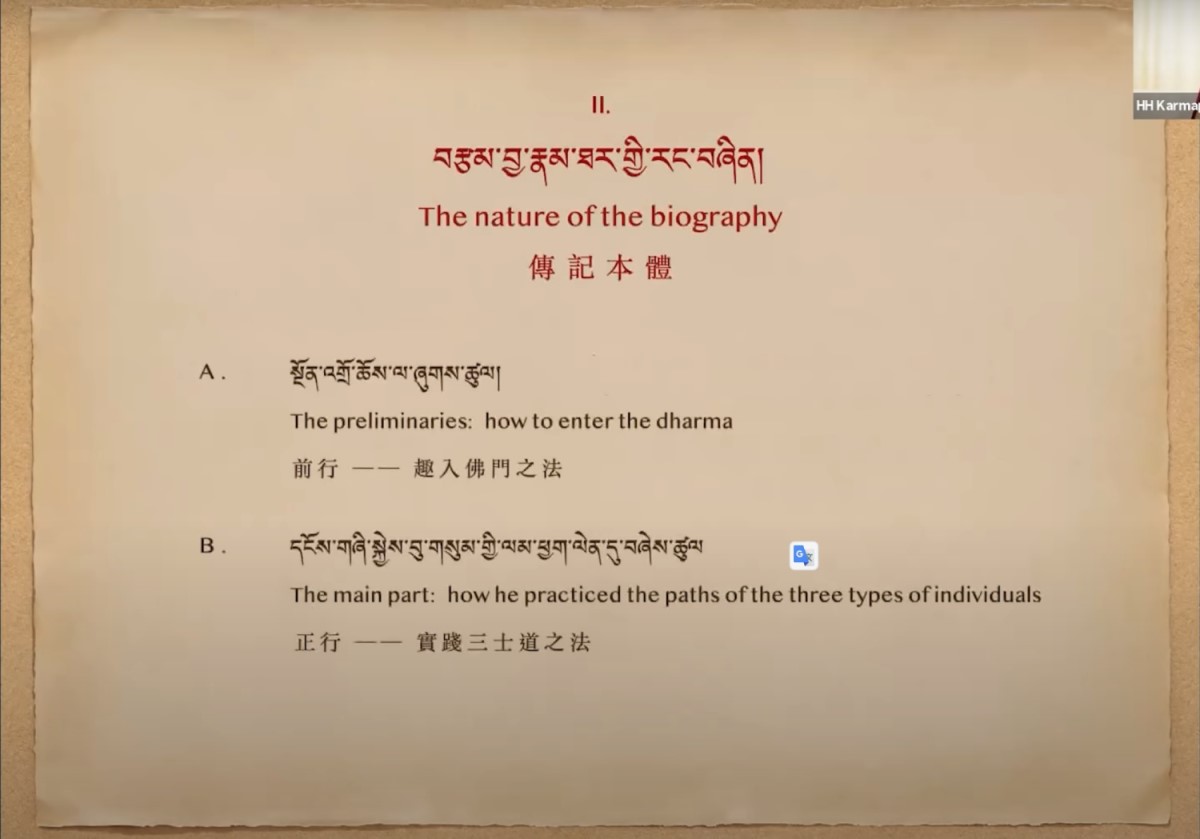
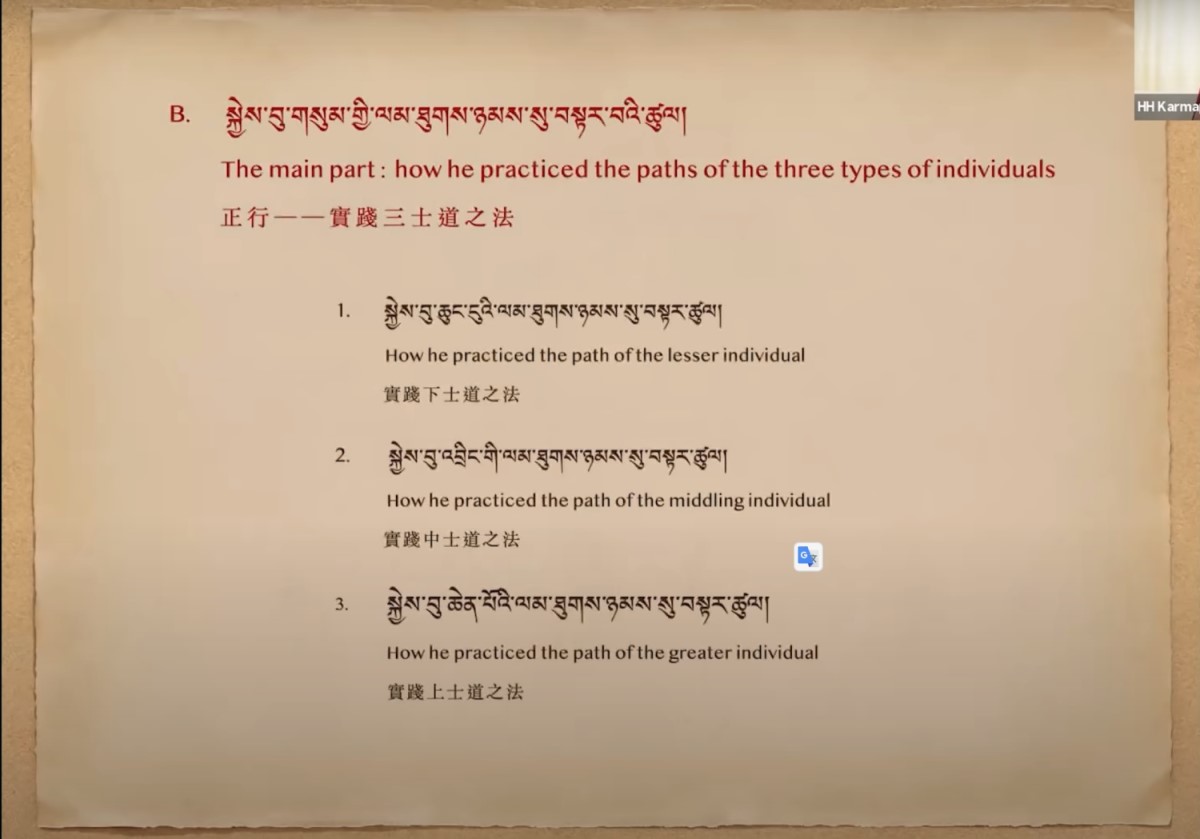
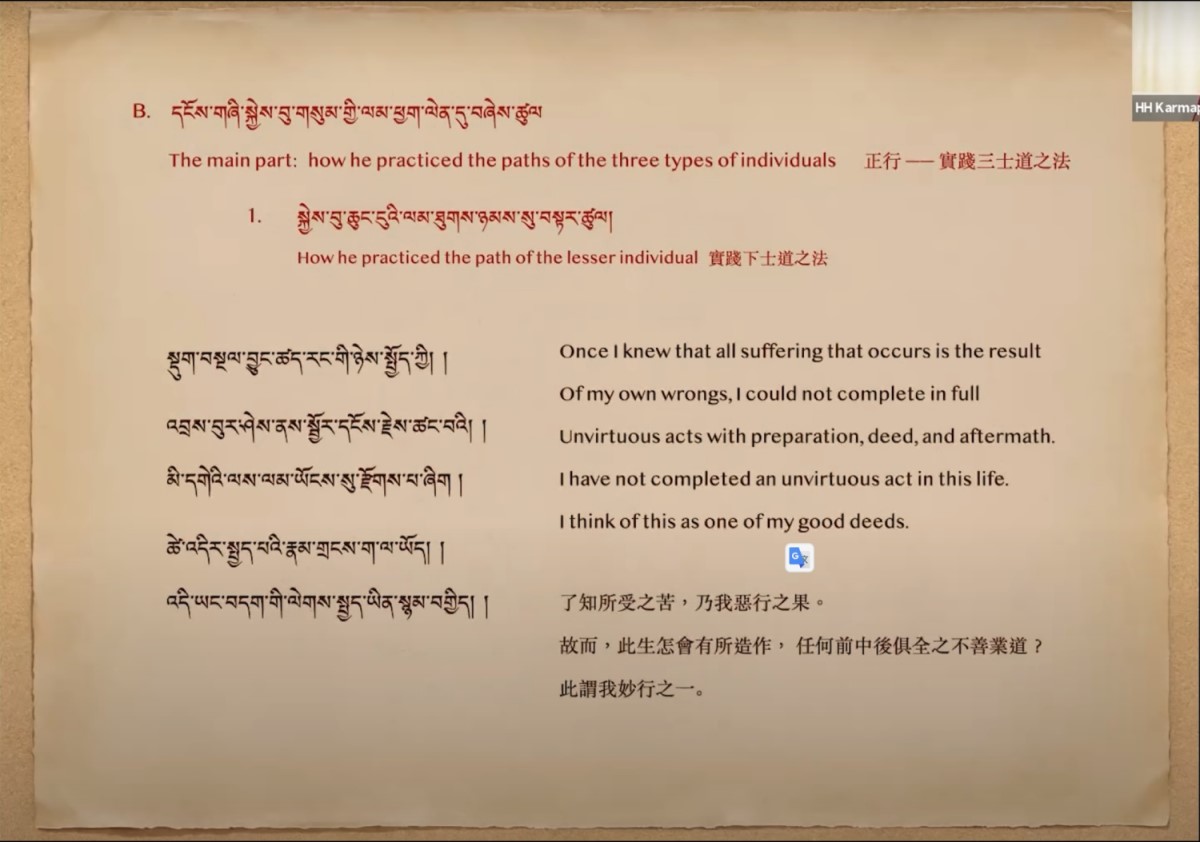
首先是第一个,实践下士道之法。它的主颂是
This is the first verse in the second main section which covers how Mikyö Dorje practised the paths of the three types of individual. This verse concerns the path of the lesser individual:
༧༽ སྡུག་བསྔལ་བྱུང་ཚད་རང་གི་ཉེས་སྤྱོད་ཀྱི། ། འབྲས་བུར་ཤེས་ནས་སྦྱོར་དངོས་རྗེས་ཚང་བའི། ། མི་དགེའི་ལས་ལམ་ཡོོངས་སུ་རྫོགས་པ་ཞིག ། ཚེ་འདིར་སྤྱད་པའི་རྣམ་གྲངས་ག་ལ་ཡོོད། ། འདི་ཡང་བདག་གི་ལེགས་སྤྱད་ཡིན་སྙམ་བགྱིད། །
Once I knew that all suffering that occurs is the result Of my own wrongs, I could not complete in full Unvirtuous acts with preparation, deed, and aftermath. I have not completed an unvirtuous act in this life. I think of this as one of my good deeds.
了知所受之苦,乃我惡行之果。故而,此生怎會有所造作,任何前中後俱全之不善業道?此謂我妙行之一。
这就是正行,实践三士道当中的第一个——实践下士道之法,那它是33个妙行中的第7个。好,那我们就先休息一下。回来的时候继续讲解。
【印度斯坦报2021.03.03】上密院新冠爆发的报道
Prajapati said investigation into the Gyuto monastery cluster suggests that the outbreak started after Losar, the Tibetan New Year, festivities on February 14.
Prajapati 说,对上密院群体的调查表明,疫情始于 2 月 14 日藏历新年庆祝活动之后。
Fifteen monks, comprising 13 from Karnataka and two from Delhi, were at the monastery from February 16 to 19.
2 月 16 日至 19 日,有 15 名,13 名来自卡纳塔克邦和两名来自德里的僧人来到寺里。
The index case in the monastery was reported on February 23 during random sampling. Since then, 330 samples have been tested of which 160 have tested positive.
2 月 23 日随机抽样,检测了 330 个样本,其中 160 个检测呈阳性。
Two patients have been shifted to Fortis Hospital in Kangra and one to Dr Rajendra Prasad Government Medical College, Tanda, while the others, who are mostly asymptomatic, have been isolated at the monastery.
两名患者已被转移到康格拉的富通医院,一名被转移到坦达的 Rajendra Prasad 政府医学院,其他大部分无症状感染者已在寺院被隔离
What has left the health authorities perplexed is the fact that the monks who came from outside Himachal Pradesh have tested negative for coronavirus. “We aren’t sure about the origin of the outbreak as those who came from Karnataka and Delhi have tested negative,” said Prajapati.
让卫生局感到困惑的是,来自喜马偕尔邦以外的僧侣的冠状病毒检测呈阴性。 “我们不确定疫情的起源,因为来自卡纳塔克邦和德里的人的检测结果呈阴性,”普拉贾帕蒂说。
Inaugurated in 1996 by the Dalai Lama, Gyuto Tantric Monastery is an important institution of the Geluk School of Tibetan Buddhism, where monks study Tantric Buddhism.
上密院由达赖喇嘛于1996年兴建,是藏传佛教格鲁派的重要机构,僧人在此学习密宗。
The monastery was home to the 17th Karmapa, Ogyen Trinley Dorje, since 2000, after he fled Tibet, to May 2017 when he moved to US and finally acquired citizenship of Dominica, a Caribbean island country, in 2018.
这座寺院成为了第十七世噶玛巴邬金钦列多杰自 2000 年逃离西藏后,到 2017 年 5 月移居美国前的住所,他于 2018 年获得加勒比岛国多米尼克的公民身份。
Youtube 视频
